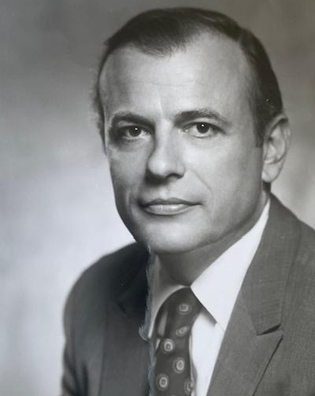 loading
loading
ObituariesIn Remembrance: Emil William Henry ’51 Died on February 1 2022 View full imageProminent attorney and advocate for education and equal rights during the most formative era of American television broadcasting, Emil William Henry was born and raised in Memphis, Tennessee, the son of Dr. John Philips Henry, the city’s only allergist, and Elizabeth Tschudy Henry. After his early schooling, Henry graduated cum laude from the Hill School and then Yale University, where he honed his love of history and a capella song. Following three years as an officer in the US Navy during the Korean campaign, he attended Vanderbilt Law School, where he edited the Law Review and joined the Order of the Coif. In 1955, he married Sherrye Eileen Patton, daughter of Clyde Lee and Effie Metcalf Patton, both outstanding Memphis citizens; and became father to Elizabeth, Sherrye Jr. (CC/GH ’81), and Emil Jr. (CC/GH ’83) while beginning his law career and receiving his first call to public service. For five years, Henry practiced with Memphis law firm Chandler Manire & Chandler and became active in the escalating civil rights movement, urging the admission of Black attorneys to the city and county bar associations while mediating federal enforcement of local antidiscrimination laws. In 1960, he took a three-month leave of absence to volunteer for John F. Kennedy’s presidential campaign, his primary focus to secure voting rights for all citizens of the South, a courageous stance to take during such tumultuous times. Two years later, President Kennedy appointed him to the Federal Communications Commission and in mid-1963 named him chairman, making him at age 34 the youngest person in US history to lead a major regulatory agency of the federal government. During his three-year tenure at the FCC, Henry became known as a vigorous but fair regulator of telecommunications industries, in particular the emerging satellite and cable systems. Recognizing the broad and powerful reach of broadcasting to shape public opinion, he became a major force to clarify and enforce the FCC’s Fairness Doctrine, which required all licensed television and radio stations to allow equal airtime to the presentation of controversial views. He also championed the cause of educational TV, actively promoting the nation’s first public television and radio networks, eventually overseeing the creation of at least 90 ETVs under recent federal funding legislation. Following government service, Henry moved to New York City, where he became CEO of a closed-circuit television company, one of the first carriers to broadcast Muhammad Ali’s boxing victories, among other sporting events. In 1972, he returned to Washington, DC, to join Ginsburg Feldman & Bress as a senior member of its communications group and eventually the firm’s managing partner. During this time, he served as chairman of the board for the US Advanced Television Standards Committee (until 1986) and sat for 14 years on the board of trustees (four years as chair) of WETA-FM, the flagship public radio station for the nation’s capital. For a decade he served as trustee of PBS. In 1994, Henry retired from law practice and returned to Memphis as CEO of the Rising Tide Foundation, a charitable organization which enabled the formation and growth of local minority-owned businesses. He became an active member of Calvary Episcopal Church, serving as senior warden on the vestry; he worked as an intake counselor at Calvary Street Ministry and the Hospitality Hub, where he was a board member and eventually chair. At the age of 71, Henry—always a man of letters and lover of the language arts—wrote two works of historical nonfiction, publishing Triumph & Tragedy: The Life of Edward Whymper (2011), about the first man to scale the peak of the Matterhorn; and Fatal Alliance: The Prosecution, Imprisonment and Gangland Murder of Jimmy Hoffa (2012), about the trial of the notorious labor union boss that took place in Nashville, Tennessee. In addition to his many accomplishments, his widespread travels, and professional triumphs, his greatest personal joy came from lifelong relationships with friends and above all, family—his most esteemed title that of “GrandBill” to his grandchildren: Madeleine (CC/GH ’14) and [grand]son-in-law Dave Alexandre, Parker Henry, and Emil Henry III; Nora Garrett and Taylor Garrett as well as his daughter-in-law Sarah Garrett and his great-grandchildren, Miles and Elmer Garrett; and his daughter-in-law, Jody Sollers Henry (CC/GH ’83). Perhaps his only regret came from not having voice to join the Whiffenpoofs, the storied a capella chorus at Yale; his greatest pride that his son Emil did, securing him honorary membership later in life. An elegant, gracious man, author and adventurer and raconteur, advocate for the underserved and counselor to anyone who came seeking his kind, judicious advice, Emil William Henry leaves a legacy of service to his community and a life informed by the twin principles of courage and common sense. “But more courage,” he might say: and we’ll all be the better for it. In remembrance, please send donations to Calvary Episcopal Church, 102 N. Second Street, Memphis, TN 38103. —Submitted by the family. |
|